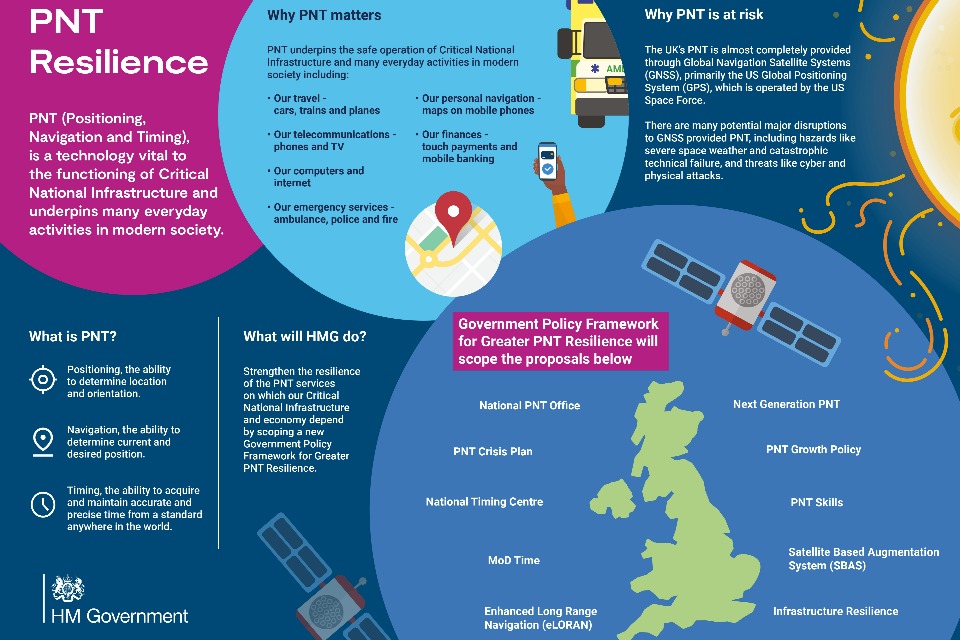Critical services to be better protected from satellite data disruptions through new Position, Navigation and Timing framework
New Position, Navigation and Timing (PNT) measures set out, which include a crisis plan in the event current PNT services are unavailable.

- New framework for Greater Position, Navigation and Timing Resilience to underpin Critical National Infrastructure (CNI) and bolster essential services like banking, defence and emergency services
- everyday activities, like television broadcasting and ensuring accurate financial transactions use Position, Navigation and Timing
- comes alongside a new report on importance of robust framework to safeguard UK economy
Sectors relying on Position, Navigation and Timing (PNT) satellite information such as emergency services and banks will be given added resilience through a new framework unveiled by Science Minister George Freeman today (Wednesday 18 October).
New measures set out in the framework include a crisis plan in the event current PNT services are unavailable, as well as the creation of a dedicated government unit to ensure critical services can operate without disruption.
The government’s policy framework for Greater Position, Navigation, and Timing Resilience will support critical sectors such as finance, defence, transportation, telecommunications, and the emergency services, by ensuring they can safely rely on PNT information to run services without interruption and serve the public.
Its ten measures and recommendations include setting up a dedicated National PNT Office in government, bolstering back up plans in case of failure of regular navigation systems such as Global Navigation Satellite Systems (GNSS), and the further scoping of technologies such as precise clocks and new satellite-based systems to ensure continuous location and timing information.
A resilient PNT system supports a range of interactions in our daily lives, from ensuring secure banking to uninterrupted television and radio broadcasts, and more widely stock market operations – ensuring the systems run smoothly, even in adverse conditions such as severe space weather events, which could disrupt PNT provided by Global Navigation Satellite Systems.
The framework also supports the PNT ambitions as set out in the National Quantum Strategy, published earlier this year.
Minister of State at the Department for Science, Innovation and Technology, George Freeman MP, said:
Position, Navigation and Timing is vital to so many of the public services we rely on daily – from the emergency services to transport, satellites and telecommunications.
Enhancing our PNT resilience and long-term capabilities is key to both Critical National Infrastructure, our economic security and resilience and strategic high growth sectors like space, future telecoms, quantum and cyber security.
Today’s policy framework, including the creation of our new National PNT Office, is a sign of our commitment to PNT as a key strategic capability.
The ten points the government is working towards implementing are:
- National PNT Office: establish a National PNT Office in the Department of Science, Innovation and Technology – to improve resilience and drive growth with responsibility for PNT policy, coordination, and delivery.
- PNT Crisis Plan: retain and update a cross-government PNT Crisis Plan to be activated if Global Navigation Satellite Systems provided PNT is lost and identify and implement short term mitigations.
- National Timing Centre: develop a proposal for a National Timing Centre– to provide resilient, terrestrial, sovereign, and high-quality timing for the UK (UTC(NPL)), including sovereign components and optical clocks.
- ‘MOD Time’: develop a proposal for ‘Ministry of Defence Time’ creating deeper resilience through a system of last resort and use National Timing Centre provided timing to support the Ministry of Defence.
- eLORAN: develop a proposal for a resilient, terrestrial, and sovereign Enhanced Long-Range Navigation system to provide backup Position and Navigation.
- Infrastructure Resilience: rollout resilient GNSS receiver chips, develop holdover clocks, and consider options for legislation on CNI sectors to require minimum resilient PNT.
- UK SBAS: develop a proposal for a UK Precise Point Positioning Satellite-Based Augmentation System to replace the UK’s use of the European Geostationary Navigation Overlay Service, monitor GNSS and enable GNSS dependent high accuracy Position for autonomous and precision uses.
- PNT Skills: explore options for Centres for Doctoral Training in timing and PNT and review PNT skills, education, and training for long term sovereign PNT capability.
- Growth Policy: develop a PNT growth policy, including R&D programmes, standards and testing, to drive innovation for PNT based productivity.
- Next Generation PNT: deploy existing R&D funding into a UK Quantum Navigator and investigate possible options for a UK sovereign regional satellite system.

Strengthening PNT capabilities, will give direction to the PNT industry, while fostering innovation, growth, and cutting-edge technology development, positioning the UK as a global PNT leader.
Alongside this framework, the government is publishing research that reveals the economic impact on the UK if the GNSS were to be disrupted. It found that a 24-hour outage could result in a £1.4 billion loss to the UK economy, with a 7-day outage costing the economy £7.6 billion.
The report, a re-evaluation of an analysis from 2017, revealed that the majority of losses during a 7-day outage stemmed from impacts on emergency services, road transport, and maritime transport, collectively representing 87.5% of the total losses. These findings underscore the necessity for a concrete PNT framework to safeguard the UK against such vulnerabilities.
This also builds on today’s release of the ‘Space Based PNT Technical Concepts’ from the UK Space Agency, which explores innovative approaches to delivering Positioning, Navigation, and Timing Services from space. These insights serve as a foundational basis for the decision-making process of the new PNT Office concerning future space-based PNT solutions.
Professor Dame Angela McLean, the Government Chief Scientific Adviser, said:
I am very pleased to see the publication of a cross-government PNT policy framework to develop the capabilities, skills and technologies that will ensure our future PNT Resilience. This framework will provide ever-increasing opportunities for economic growth, employment and innovation for the UK.
PNT resilience was identified as a significant issue in the 2018 Blackett Report Satellite-derived Time and Position: A Study of Critical Dependencies - this policy framework will help address the challenges set out there.
John Pottle, Director of the Royal Institute of Navigation, said:
Today’s significant and very welcome announcement recognises that achieving greater PNT resilience is a multi-faceted endeavour. The ownership provided by the National PNT Office will provide policy and delivery oversight, and co-ordination across all stakeholders.
As well as improving national preparedness, the PNT framework has potential to help further strengthen the UK’s thought leadership and innovation in robust and resilient PNT.
Dr Peter Thompson, CEO, National Physical Laboratory (NPL), said:
The inclusion of a commitment to develop a proposal for a National Timing Centre in the new government policy framework for Greater PNT Resilience is an important step to improving timing resilience for UK critical infrastructure and the wider economy.”
The NPL, as the home of accurate time in the UK and the national technical authority for time and frequency, will continue to work with DSIT on the challenge of timing resilience, building on the ongoing National Timing Centre R&D programme.
David Henderson, Chief Geospatial Officer at Ordnance Survey said:
With new technology-enabled ecosystems like autonomous vehicles and digital twins starting to take shape, it’s the perfect time to be thinking in a strategic way about how we use and develop our position, navigation and timing systems.
We have the infrastructure and know-how in the UK to help us think innovatively about how to better connect our digital and physical places, and the PNT framework sets out a clear way of thinking of how we can strengthen that.
Notes to editors
This framework builds on the previous work in government on PNT, including the 2018 Blackett Report, Satellite-derived Time and Position: A Study of Critical Dependencies and the work of the UK Space Agency’s Space Based PNT Programme.
It also follows the commitment in the 2021 Integrated Review of Security, Defence, Development and Foreign Policy to strengthen the resilience of the PNT services on which our CNI and economy depend and the inclusion of loss of PNT services in the 2023 National Risk Register, the external version of the National Security Risk Assessment, which is the government’s assessment of the most serious risks facing the UK.
The Department for Science, Innovation and Technology re-allocated £14 million of existing funding at the end of the last financial year to the National Physical Laboratory’s National Timing Centre Research and Development programme, that will now run until March 2025. This programme is the precursor to, and key building block of, developing a National Timing Centre, as outlined at point three of the policy framework.
The analysis was originally conducted by London Economics in 2017 to assess the impact on the UK economy of an outage of the existing GNSS. It looks at the impact on a wide range of sectors of a 7-day outage of GNSS and a 24-hour outage of GNSS.
The Space Based PNT Programme (SBPP) was set up to look at alternative concepts for the delivery of Positioning, Navigation and Timing Services from space. A previous programme had looked at the viability of the UK developing a conventional Global Navigation Satellite (GNSS) System similar to GPS or Galileo.
The National Timing Centre R&D programme was announced in February 2020 and is led by the National Physical Laboratory in partnership with others, including Innovate UK.